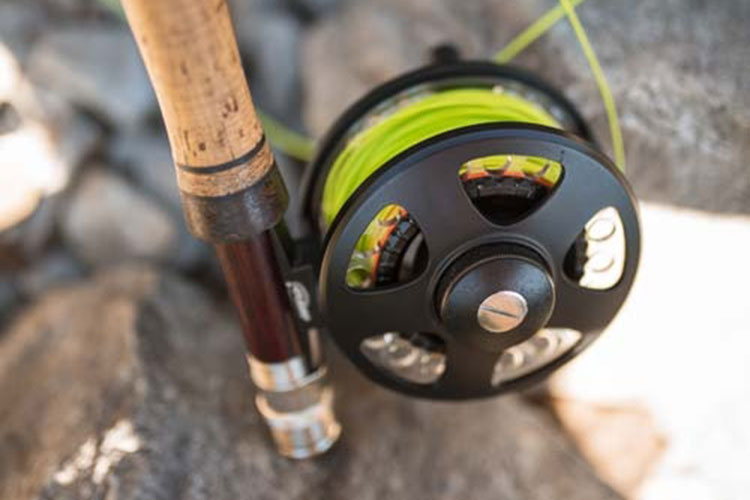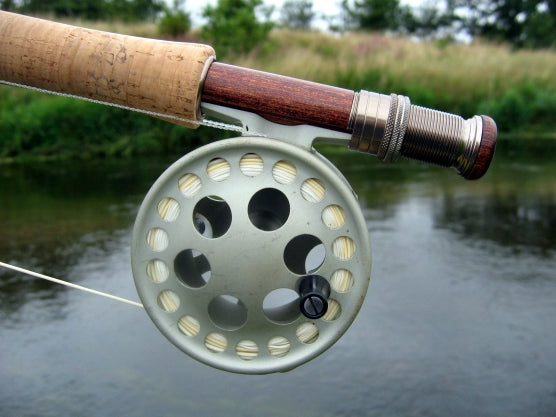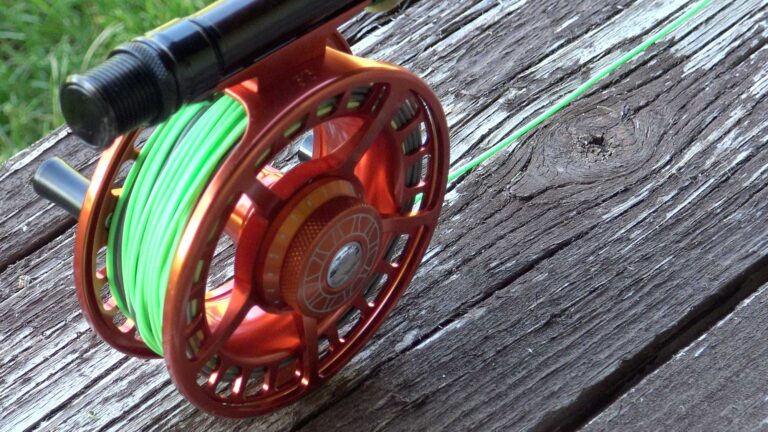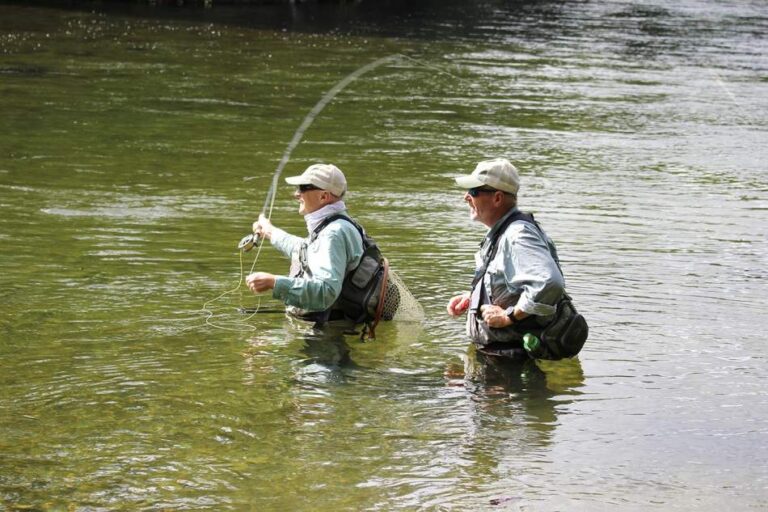Yes, there are specialized reels for both fly fishing in saltwater and freshwater environments. Fly fishing reels designed for saltwater use typically have corrosion-resistant components and are built to withstand the harsh conditions of ocean fishing.
On the other hand, freshwater fly fishing reels are designed to be lightweight and sensitive for a better casting experience in rivers and lakes. Whether you’re fishing in the saltwater or freshwater, having a specialized reel can greatly enhance your fly fishing experience and ensure the longevity of your gear.
We will explore the different features of specialized fly fishing reels for saltwater and freshwater environments, and how they can improve your fishing performance. So, keep reading to find out more about these specialized reels for fly fishing. From the materials used to the drag system, we’ll cover everything you need to know about choosing the right reel for your specific fishing needs. So, let’s dive in.

Credit: www.flyfisherman.com
Understanding The Importance Of Specialized Reels
Are there any specialized reels for fly fishing in saltwater or freshwater?
When it comes to fly fishing, having the right equipment is crucial for a successful and enjoyable experience. One of the key components of fly fishing gear is the reel. While regular fly fishing reels can be used in both saltwater and freshwater environments, specialized reels specifically designed for each type of water offer significant advantages.
Here, we will explore what sets specialized reels apart from regular fly fishing reels and the significance of using the right reel for saltwater and freshwater fly fishing.
What Sets Specialized Reels Apart From Regular Fly Fishing Reels:
- Durability: Specialized reels for saltwater fly fishing are built to withstand the harsh environments, including exposure to saltwater, which can corrode regular reels over time. These specialized reels are often constructed with materials such as anodized aluminum or corrosion-resistant alloys, ensuring longevity and saltwater resistance.
- Resistance to rust and corrosion: Apart from durability, specialized saltwater fly fishing reels are designed with features that offer enhanced resistance to rust and corrosion. This is especially important when faced with constant exposure to saltwater, which can cause regular reels to deteriorate rapidly. By using specialized reels, anglers can avoid the hassle of dealing with rusted or corroded equipment.
- Increased line capacity: Saltwater fly fishing requires longer, stronger lines to withstand the challenges posed by larger fish and strong currents. Specialized saltwater fly fishing reels often have larger line capacities, allowing for ample backing and ensuring you have enough line to handle powerful saltwater species.
The Significance Of Using The Right Reel For Saltwater And Freshwater Fly Fishing:
For optimal performance and a satisfying fishing experience, it’s crucial to use the right reel for the specific environment you plan on fishing in. Here’s why specialized reels are essential for saltwater and freshwater fly fishing:
- Saltwater fly fishing: Saltwater presents unique challenges for fly fishermen due to the corrosive properties of salt and the larger, more powerful fish species found in these waters. Specialized saltwater reels offer superior resistance to corrosion and rust, ensuring that your equipment remains in top condition. These reels also provide the necessary strength and line capacity to handle the demanding nature of saltwater fishing.
- Freshwater fly fishing: While regular fly fishing reels can be used in freshwater, specialized freshwater reels have their advantages. Designed with features specific to freshwater fishing, these reels are often lighter and more compact, making them convenient to carry and maneuver. Additionally, freshwater reels usually have smaller line capacities, which can be beneficial when targeting smaller fish species found in freshwater environments.
How Specialized Reels Enhance Performance And Fishing Experience:
- Improved functionality: Specialized reels are meticulously designed to suit the unique demands of either saltwater or freshwater fishing. With features such as drag systems tailored for the specific conditions, these reels offer smoother and more precise control over the line, resulting in improved casting accuracy and the ability to handle hard-fighting fish effectively.
- Enhanced durability: By using specialized reels, anglers can minimize the risk of equipment failure and ensure their gear remains in excellent condition for longer periods. With materials and construction techniques optimized for their respective environments, specialized reels can withstand the challenges posed by saltwater or freshwater fishing, providing peace of mind and a reliable tool for anglers.
Remember, when venturing into the diverse realms of fly fishing, having the appropriate equipment is vital. By understanding the key differences between specialized reels and regular fly fishing reels, and the importance of choosing the right reel for saltwater or freshwater fly fishing, you can enhance your performance, enjoy a more rewarding fishing experience, and ensure your equipment stands the test of time.
So, get out there, explore your favorite fishing spots, and make the most of the tailored benefits offered by specialized reels. Happy fishing!
Exploring Fly Fishing Reels For Saltwater
Understanding The Unique Challenges Of Saltwater Fly Fishing
Saltwater fly fishing presents its own set of challenges compared to freshwater fly fishing. The harsh conditions and the powerful nature of saltwater fish require specialized gear, including reels. Here are some key points to keep in mind:
- Saltwater fishing environments can be corrosive due to the high salt content in the water. This can cause damage to traditional reels if not properly protected.
- Saltwater fish are typically larger and more powerful than freshwater fish, which means your reel must have a strong drag system to handle their strength.
- Saltwater fly fishing often requires longer casts and faster line retrieval due to the larger size of the fishing grounds and the speed of saltwater species.
Features To Consider When Choosing A Reel For Saltwater Fly Fishing
When selecting a reel for saltwater fly fishing, several features should be taken into consideration. These include:
- Corrosion resistance: Look for reels made from materials such as anodized aluminum or stainless steel, which are better equipped to handle the corrosive nature of saltwater.
- Drag system strength: A powerful, smooth drag system is essential for fighting and landing saltwater fish.
- Line capacity: Saltwater fish often make long, fast runs, so having enough line capacity is crucial to prevent running out of line.
- Retrieval rate: A reel with a high retrieval rate allows you to quickly bring in line, making it easier to keep up with fast-moving fish.
Top Specialized Reel Options For Saltwater Fly Fishing
Here are three top specialized reel options for saltwater fly fishing:
Reel A: [Brand Name] – [Brief Description]
- Constructed with corrosion-resistant materials to withstand the harsh saltwater environment.
- Features a strong drag system with precise adjustment capabilities.
- Offers ample line capacity to handle long runs and powerful fish.
- Boasts a high retrieval rate for quick line retrieval.
Reel B: [Brand Name] – [Brief Description]
- Designed specifically for saltwater fly fishing, with a focus on corrosion resistance.
- Equipped with a powerful drag system that can handle large saltwater species.
- Ample line capacity to tackle long runs and fast fish.
- Offers a moderate retrieval rate for balanced line control.
Reel C: [Brand Name] – [Brief Description]
- Crafted from durable materials to resist saltwater corrosion.
- Boasts an exceptionally strong drag system for tackling aggressive saltwater fish.
- Provides generous line capacity for extended battles.
- Features a high-speed retrieval rate for rapid line retrieval.
With these specialized reels, you’ll be well-equipped to tackle the unique challenges of saltwater fly fishing and increase your chances of landing those trophy fish. Remember to choose a reel that meets your specific needs and preferences, ensuring a successful and enjoyable fishing experience.
So get out there and explore the stunning world of saltwater fly fishing!
Choosing The Right Reel For Freshwater Fly Fishing
Differences Between Saltwater And Freshwater Fly Fishing Reels:
When it comes to selecting a fly fishing reel, it’s important to consider the specific type of fishing you’ll be doing. There are key differences between saltwater and freshwater fly fishing reels that you should be aware of. Here are a few points to keep in mind:
- Saltwater reels are designed to withstand the harsh conditions of saltwater environments, which can be corrosive and abrasive to equipment. They are typically made of materials that are resistant to corrosion, such as anodized aluminum or stainless steel.
- Freshwater reels, on the other hand, are not exposed to the same level of corrosion and can be constructed from lighter materials like graphite or composite materials. They are generally more lightweight and less expensive compared to saltwater reels.
Factors To Consider When Selecting A Reel For Freshwater Fly Fishing:
Choosing the right reel for freshwater fly fishing is crucial for a successful and enjoyable fishing experience. Here are some key factors to consider when making your selection:
- Lightweight design: Opt for a reel that is lightweight as it will reduce fatigue during long casting sessions and make the overall fishing experience more comfortable.
- Smooth drag system: A smooth drag system is essential for effectively controlling the line when fighting fish. Look for a reel with a reliable and smooth drag system to ensure a seamless fishing experience.
- Line weight compatibility: Ensure that the reel is designed to accommodate the line weight you’ll be using. Different fly lines require different reel sizes, so it’s important to match them up correctly.
- Balance and maneuverability: Consider the balance and maneuverability of the reel. A well-balanced reel will help maintain control over the rod and provide better accuracy during casting.
Top Specialized Reel Options For Freshwater Fly Fishing:
When it comes to specialized reels for freshwater fly fishing, there are several top options available on the market. Here are a few notable ones:
- Reel x: [brand name] – [brief description]
- Bullet point: High-quality construction with a durable aluminum frame.
- Bullet point: Smooth drag system for precise control over the line.
- Bullet point: Lightweight design for reduced fatigue during extended fishing trips.
- Reel y: [brand name] – [brief description]
- Bullet point: Innovative design with advanced features for enhanced performance.
- Bullet point: Easy-to-use drag system for hassle-free line control.
- Bullet point: Perfect balance for improved maneuverability and accuracy.
- Reel z: [brand name] – [brief description]
- Bullet point: Sleek and stylish design coupled with exceptional functionality.
- Bullet point: Superior drag system for smooth and consistent line control.
- Bullet point: Great versatility to handle a wide range of fishing situations.
Remember, when selecting a reel for freshwater fly fishing, consider the specific requirements of your fishing style and preferences. With the right reel in hand, you’ll be well-equipped to make the most of your fly fishing adventures in freshwater.
Maintaining And Caring For Specialized Reels
Are there any specialized reels for fly fishing in saltwater or freshwater
Importance Of Proper Maintenance For Longevity And Performance
Maintaining and caring for specialized reels is crucial to ensure their longevity and optimal performance. Whether you are fishing in saltwater or freshwater, regular maintenance is necessary to keep your reels in top condition. Here are the key reasons why proper maintenance is important:
- Prolonged lifespan: Regular maintenance helps prevent wear and tear, which can extend the lifespan of your specialized reel. By taking the time to care for your reel, you can avoid costly repairs or the need for a replacement.
- Smooth operation: Proper maintenance ensures smooth reel operation, ensuring that you can cast and retrieve with ease. By keeping your reel well-maintained, you can avoid any glitches or malfunctions that may impact your fishing experience.
- Optimal performance: A well-maintained reel performs at its best. By regularly cleaning and lubricating your specialized reel, you can enhance its overall performance, including its casting distance, line management, and drag system.
Steps For Cleaning And Lubricating Specialized Reels
To maintain the functionality and longevity of your specialized reel, follow these steps for cleaning and lubricating:
- Rinse with freshwater: After each fishing session, rinse your reel with freshwater to remove any salt, sand, or debris. This will help prevent corrosion and damage to the reel components.
- Disassemble and clean: Carefully disassemble your reel, following the manufacturer’s instructions. Clean each component using a mild soap or specialized reel cleaner. Use a soft brush or cloth to remove any dirt or grime.
- Inspect and replace parts if needed: While cleaning, thoroughly inspect each part of your reel. If you notice any signs of damage, such as worn-out gears or springs, consider replacing them to maintain optimal performance.
- Lubricate moving parts: Apply a small amount of reel oil or grease to lubricate the moving parts of your reel. Focus on areas such as the gears, bearings, and drag system. Be cautious not to over-lubricate, as this can attract dirt and debris.
- Reassemble and test: Once cleaned and lubricated, carefully reassemble your specialized reel, ensuring all components fit together correctly. Test the reel’s functionality by casting and retrieving to ensure smooth operation.
Common Mistakes To Avoid When Maintaining Reels
While maintaining your specialized reel, it is important to avoid certain common mistakes that can potentially damage or reduce its performance. Here are some mistakes to avoid:
- Using harsh chemicals: Using harsh chemicals or solvents can damage the reel’s finish or internal components. Stick to mild soap or specialized reel cleaners specifically designed for cleaning reels.
- Overlooking drying time: After rinsing your reel, ensure it is thoroughly dried before reassembling. Moisture left inside the reel can cause corrosion and damage over time.
- Neglecting regular maintenance: Failing to perform regular maintenance can lead to a build-up of dirt, debris, and corrosion, affecting the reel’s performance and longevity. Make it a habit to clean and lubricate your reel after each fishing trip.
- Incorrect assembly: Improperly reassembling the reel can result in malfunctions and poor performance. Always refer to the manufacturer’s instructions when reassembling your specialized reel.
Additional Tips For Protecting Reels From Saltwater And Freshwater Elements
To protect your specialized reel from the elements, whether in saltwater or freshwater environments, consider these additional tips:
- Store properly: When not in use, store your reel in a cool, dry place to avoid exposure to moisture, extreme temperatures, or direct sunlight. Use a reel cover or case for added protection.
- Rinse after saltwater use: If you’ve been fishing in saltwater, it is crucial to rinse your reel thoroughly with freshwater to remove any salt residue. Salt can corrode metal parts and impact the reel’s performance.
- Apply a protectant: Consider applying a reel protectant or corrosion inhibitor to provide an additional layer of protection against saltwater or freshwater elements. These products help repel moisture and prevent corrosion.
- Regular inspections: Periodically inspect your reel for any signs of damage, rust, or wear. Promptly address any issues to prevent further damage and ensure your reel continues to perform optimally.
By following these maintenance tips and caring for your specialized reel, you can enjoy many successful fishing trips and maximize the lifespan and performance of your equipment.
Conclusion: Enhance Your Fly Fishing Experience With The Right Reel
Recap Of The Importance Of Using Specialized Reels
Using specialized reels for fly fishing is crucial for a successful and enjoyable outing. These reels are specifically designed to withstand the harsh conditions of saltwater or freshwater environments. They offer several advantages over general-purpose reels, such as increased durability, resistance to corrosion, and improved line handling.
By investing in a specialized reel, you can enhance your fly fishing experience and increase your chances of landing that big catch.
Choosing The Right Reel Based On Fishing Environment And Preferences
When it comes to fly fishing, it’s important to choose the right reel based on your fishing environment and personal preferences. Here are some key factors to consider:
- Saltwater reels: If you plan to fish in saltwater, opt for a reel that is specifically designed to withstand the corrosive effects of salt. Look for reels made from materials such as anodized aluminum or stainless steel, which provide excellent corrosion resistance.
- Freshwater reels: For freshwater fly fishing, you have more options when it comes to reel materials. Consider factors such as weight, balance, and line capacity to find a reel that suits your fishing style and target species.
- Drag system: The drag system of a reel is an important consideration, as it determines how smoothly and consistently the line is released during a fight with a fish. Look for reels with a sealed drag system, which provides greater protection against water and debris.
- Retrieve type: Choose between a single-action or multiplier reel based on your preferences. Single-action reels are simpler and easier to use, while multiplier reels offer faster line retrieval but may be more complex to operate.
By taking into account these factors and choosing a reel that aligns with your fishing environment and preferences, you can ensure a more enjoyable and successful fly fishing experience.
How Specialized Reels Contribute To A Successful And Enjoyable Fly Fishing Outing
Specialized reels play a crucial role in enhancing your fly fishing experience in several ways:
- Durability: Fly fishing in saltwater or freshwater environments can expose your gear to harsh conditions. Specialized reels are designed to withstand these conditions, with materials and coatings that provide durability and longevity.
- Corrosion resistance: Saltwater can be particularly corrosive to fishing gear, including reels. Specialized saltwater reels are made from corrosion-resistant materials, such as anodized aluminum or stainless steel, to ensure they can withstand the saltwater environment.
- Line handling: Specialized reels are designed to handle specific types of fly lines, such as saltwater lines or freshwater lines. They offer optimal line capacity, smooth line retrieval, and precise drag control, allowing for more efficient and effective fly fishing.
- Performance: By using a specialized reel, you can achieve better casting distance, accuracy, and line control. This can greatly improve your chances of presenting your fly in the right spot and enticing fish to bite.
Using specialized reels for fly fishing in saltwater or freshwater environments is essential to enhance your overall experience. These reels provide the necessary durability, corrosion resistance, line handling, and performance to ensure a successful and enjoyable outing. By considering your fishing environment and personal preferences, you can choose the right reel that best suits your needs and maximize your chances of a memorable fly fishing adventure.
Conclusion
Whether you are fly fishing in saltwater or freshwater, having a specialized reel can make a world of difference. These reels are specifically designed to handle the unique challenges presented in each environment, such as corrosion resistance for saltwater and smooth drag for freshwater.
By choosing a reel that is suited to your fishing conditions, you can enhance your overall experience and increase your chances of success. When selecting a reel, consider factors such as the material, size, and features that will best suit your needs.
Remember to maintain your reel properly to ensure it lasts for many fishing adventures to come. So, next time you head out to cast a line, make sure you have the right reel for the job. Happy fishing!





